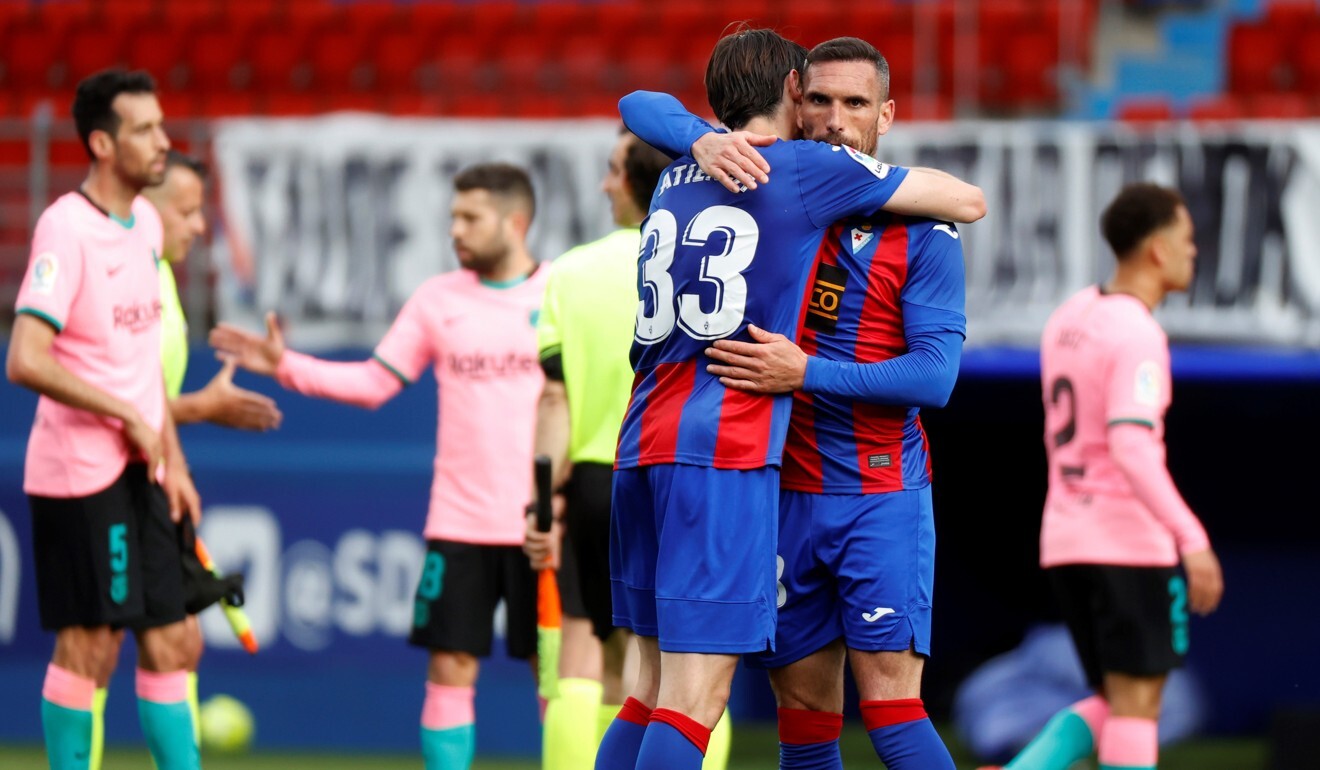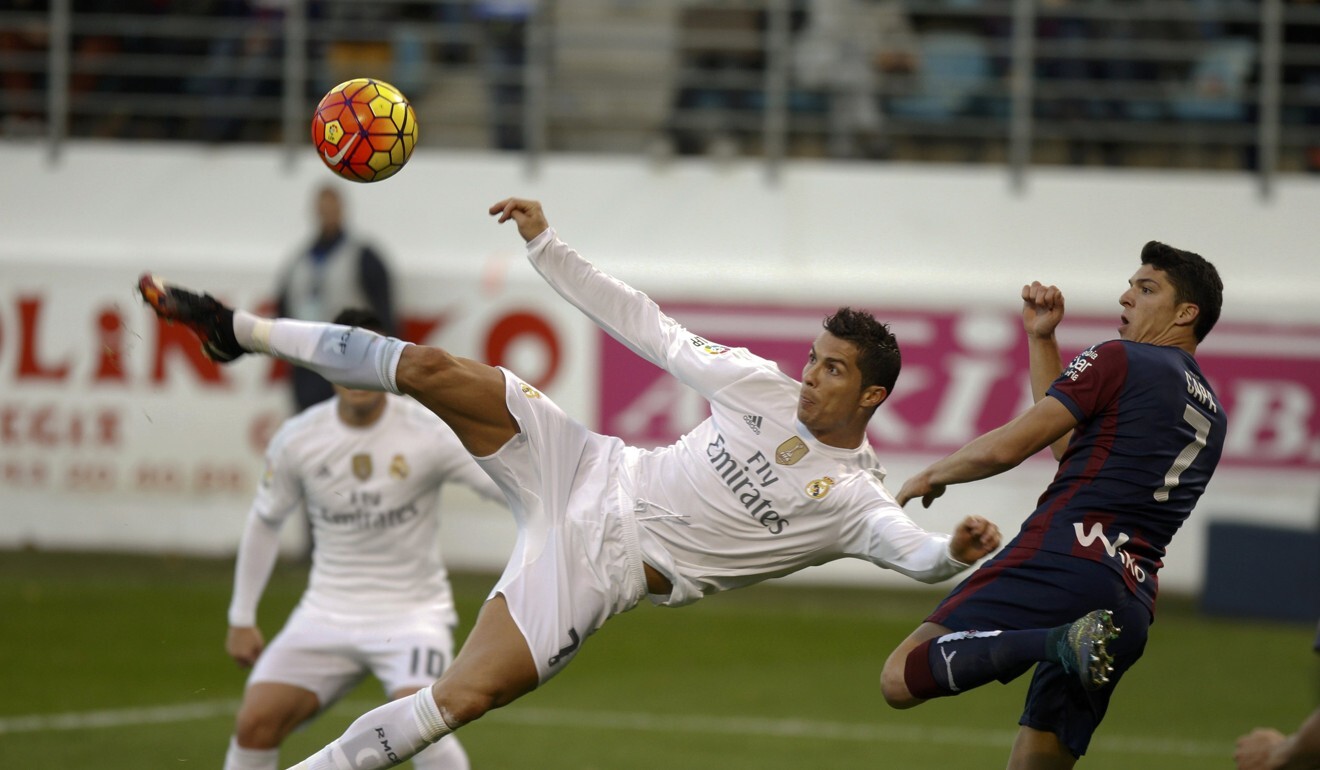Learn more

Big in Japan (and China): Asian faves Eibar end La Liga stay after seven seasons
- ‘My team play Real Madrid’ leave request went viral in China as shareholders travelled to watch club despite visa trouble
- Japanese star Takeshi Inui, in two spells at club, boosted Los Armeros’ popularity in Asia

When SD Eibar were relegated from La Liga, it was not just the 27,000 inhabitants of the Basque country town that mourned Los Armeros returning to the Segunda Division.
Rather, relegation was also felt across the world, including China and Japan, where the team have gained something of a cult following over the last seven years, not least for being the reason for the most shared leave letter on Chinese social media.
In the end it was fitting that the curtain was drawn on lowly Eibar’s time in La Liga with the visit of Barcelona.
Not because seeing the likes of Lionel Messi (who was absent on Saturday) at their Ipurua ground was the last thing on the club’s mind for most of their history, which was been spent in the lower reaches of Spanish football, but because that historic promotion was celebrated with confetti that had been earmarked for Barcelona.

The Catalans saw their title celebrations put on ice and the cut-price confetti went up to Eibar, who share the same colour scheme.
Promotion brought a headache for the Eibar board. The club did not have enough share capital to go up to La Liga, falling short of Spanish expectations and threatened with being dropped down to the third tier.

So the club sought investment and in doing so set themselves on the path to becoming one of Asia’s favourite teams, especially in China and Japan.
The “Defend Eibar” campaign was launched to sell shares in the club, supported by Xabi Alonso and David Silva, two Spanish internationals who had played at Eibar on loan earlier in their illustrious careers.
A month ahead of schedule it was announced in July 2014 that Eibar had reached their goal in record time.
Chinese fans were among those to have bought shares in the club to ensure that they could go up, the second largest contingent outside Spain.
The New York Times reported at the time that around 8,000 people bought shares. “Most were Spaniards, but people from 47 other countries also bought shares, including 400 American investors, the biggest foreign contingent, with Chinese purchasers second,” they wrote.

After coming close to being relegated down to the third tier, Eibar benefited from red tape 12 months later.
After finishing 18th and being relegated in their first ever season in La Liga, they were given a reprieve as Elche were sent down due to financial irregularities despite finishing 13th. Unlucky for some.
By this point, fans from around the world had followed the team, who now have 11,130 shareholders from 65 different countries, according to the club website.
Chinese interest in the club had grown on social media after an article by journalist Sid Lowe was translated into Chinese.
By January 2016, there was an official Chinese fan club becoming the 17th supporters group across eight different countries around the world. The 20-person strong EibarCN was based in Xuchang, a city of more than 4.6 million people in Henan province.
A month later the club was wishing Chinese fans a happy year of the monkey on social media, proof of their growing presence in the country.
Fan club president Liu Yuxiang, an Eibar supporter and shareholder, visited Ipurua in November, 2014, and stayed in contact with the club.
He was not the only Chinese fan to visit the club, who had invited five of their Chinese shareholders to watch them play Real Madrid.
Eibar shareholder Wu Bin’s application for leave – “My club play Real Madrid” – went viral on Chinese social media with millions seeing his request for time off and it making headlines in mainstream outlets such as the Beijing Times.
Two other Chinese shareholders saw their visa applications turned down by the Spanish consulate in Shanghai – apparently their bank accounts did not match up with their claims to be shareholders – but there was a happy ending for them too.
Thanks to the intervention of the Eibar chairman they were granted visas and their trip was filmed for a Vice China documentary, featuring Lowe and the Chinese fans.
Interest from Japan was driven by the signing of Japanese international Takashi Inui in 2015. The Samurai Blue star’s presence saw the club become third in La Liga’s viewing figures in Japan, behind Barcelona and Real Madrid.
Eibar had already sold Inui to Real Betis by the time that they signed their first commercial partner in Japan, though he returned to the club in 2019 and went closest to scoring against Barcelona at the weekend.
That commercial reach was among the reasons that the Financial Times named Eibar among their FT 1000 list of Europe’s fastest growing companies for two years in a row, most recently in March 2019
It might not have been as celebrated as them beating Real Madrid for the first time in their history in November, 2018, but the financial disparity between the richest club in football and lowly Eibar shows that there is still place for David to beat Goliath.

They remain the smallest club, with the smallest stadium and smallest budget to play in La Liga and they more than made up the numbers along the way, as a best finish of ninth in 2018 shows.
Whether they return to the top flight or not, there will be some small corners of Asia that are forever Eibar.

When SD Eibar were relegated from La Liga, it was not just the 27,000 inhabitants of the Basque country town that mourned Los Armeros returning to the Segunda Division.
Rather, relegation was also felt across the world, including China and Japan, where the team have gained something of a cult following over the last seven years, not least for being the reason for the most shared leave letter on Chinese social media.
In the end it was fitting that the curtain was drawn on lowly Eibar’s time in La Liga with the visit of Barcelona.
Not because seeing the likes of Lionel Messi (who was absent on Saturday) at their Ipurua ground was the last thing on the club’s mind for most of their history, which was been spent in the lower reaches of Spanish football, but because that historic promotion was celebrated with confetti that had been earmarked for Barcelona.
The Catalans saw their title celebrations put on ice and the cut-price confetti went up to Eibar, who share the same colour scheme.
Promotion brought a headache for the Eibar board. The club did not have enough share capital to go up to La Liga, falling short of Spanish expectations and threatened with being dropped down to the third tier.
So the club sought investment and in doing so set themselves on the path to becoming one of Asia’s favourite teams, especially in China and Japan.
The “Defend Eibar” campaign was launched to sell shares in the club, supported by Xabi Alonso and David Silva, two Spanish internationals who had played at Eibar on loan earlier in their illustrious careers.
A month ahead of schedule it was announced in July 2014 that Eibar had reached their goal in record time.
Chinese fans were among those to have bought shares in the club to ensure that they could go up, the second largest contingent outside Spain.
The New York Times reported at the time that around 8,000 people bought shares. “Most were Spaniards, but people from 47 other countries also bought shares, including 400 American investors, the biggest foreign contingent, with Chinese purchasers second,” they wrote.
After coming close to being relegated down to the third tier, Eibar benefited from red tape 12 months later.
After finishing 18th and being relegated in their first ever season in La Liga, they were given a reprieve as Elche were sent down due to financial irregularities despite finishing 13th. Unlucky for some.
By this point, fans from around the world had followed the team, who now have 11,130 shareholders from 65 different countries, according to the club website.
Chinese interest in the club had grown on social media after an article by journalist Sid Lowe was translated into Chinese.
By January 2016, there was an official Chinese fan club becoming the 17th supporters group across eight different countries around the world. The 20-person strong EibarCN was based in Xuchang, a city of more than 4.6 million people in Henan province.
A month later the club was wishing Chinese fans a happy year of the monkey on social media, proof of their growing presence in the country.
Fan club president Liu Yuxiang, an Eibar supporter and shareholder, visited Ipurua in November, 2014, and stayed in contact with the club.
He was not the only Chinese fan to visit the club, who had invited five of their Chinese shareholders to watch them play Real Madrid.
Eibar shareholder Wu Bin’s application for leave – “My club play Real Madrid” – went viral on Chinese social media with millions seeing his request for time off and it making headlines in mainstream outlets such as the Beijing Times.
Two other Chinese shareholders saw their visa applications turned down by the Spanish consulate in Shanghai – apparently their bank accounts did not match up with their claims to be shareholders – but there was a happy ending for them too.
Thanks to the intervention of the Eibar chairman they were granted visas and their trip was filmed for a Vice China documentary, featuring Lowe and the Chinese fans.
Interest from Japan was driven by the signing of Japanese international Takashi Inui in 2015. The Samurai Blue star’s presence saw the club become third in La Liga’s viewing figures in Japan, behind Barcelona and Real Madrid.
Eibar had already sold Inui to Real Betis by the time that they signed their first commercial partner in Japan, though he returned to the club in 2019 and went closest to scoring against Barcelona at the weekend.
That commercial reach was among the reasons that the Financial Times named Eibar among their FT 1000 list of Europe’s fastest growing companies for two years in a row, most recently in March 2019
It might not have been as celebrated as them beating Real Madrid for the first time in their history in November, 2018, but the financial disparity between the richest club in football and lowly Eibar shows that there is still place for David to beat Goliath.
They remain the smallest club, with the smallest stadium and smallest budget to play in La Liga and they more than made up the numbers along the way, as a best finish of ninth in 2018 shows.
Whether they return to the top flight or not, there will be some small corners of Asia that are forever Eibar.
